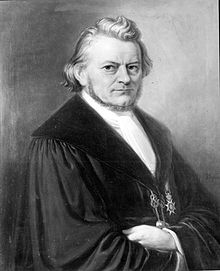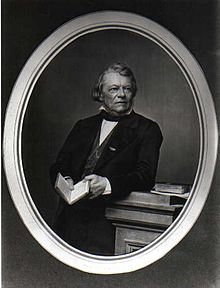Immanuel Hermann Fichte
Immanuel Hermann Fichte , from 1863 by Fichte , (* July 18, 1796 in Jena , † August 8, 1879 in Stuttgart ) was a German Protestant theologian and philosopher . He was the son of the philosopher Johann Gottlieb Fichte .
Life
Immanuel Hermann Fichte studied in Berlin , where he was accused of demagoguery because of his public statements . Only in 1836 did Fichte get a job as a full professor in Bonn . From 1842 he took over a chair for philosophy in Tübingen . On his retirement in 1863 he was awarded the Knight's Cross of the Order of the Württemberg Crown by King Wilhelm I of Württemberg , which was associated with the personal nobility. Since 1855 he was a foreign member of the Bavarian Academy of Sciences .
Fichte was influenced by Herbart and Leibniz , by Hegel's religious philosophy and by Schelling's late work . He embodied especially with Christian Hermann Weisse the theistic late idealism . In old age he approached theosophy . In addition to his numerous works of his own, he edited several volumes from his father's estate.
Honors
- The plant genus Fichtea Sch.Bip. from the sunflower family (Asteraceae) honors Johann Gottlieb Fichte and Immanuel Hermann Fichte.
Works (selection)
-
About the contrast, turning point and goal of today's philosophy
- First critical part. Mohr, Heidelberg 1832
- Second speculative part: Basic features of the systems of philosophy . In three sections:
- 1: Knowledge as self-knowledge . Mohr, Heidelberg 1833; Scientia, Aalen 1969
- 2: The ontology . Mohr, Heidelberg 1836; Scientia, Aalen 1969
- 3: Speculative theology or general religion . Mohr, Heidelberg 1846; Scientia, Aalen 1969
- The idea of personality and individual persistence . Büschler, Elberfeld 1834
- Contributions to the characteristics of modern philosophy, or the critical history of it, from Des Cartes and Locke to Hegel . Seidel, Sulzbach 1841; Scientia, Aalen 1968, 2nd A. ibid. 1983, ISBN 3-511-00496-9
-
System of ethics . 2 parts:
- 1., critical part: The philosophical doctrines of law, state and custom in Germany, France and England from the middle of the eighteenth century to the present . Dyk, Leipzig 1850; Keip, Frankfurt am Main 1969
- 2nd, performing part in two volumes:
- The general ethical concepts and the doctrine of virtue and duty . Dyk, Leipzig 1851; Keip, Frankfurt am Main 1969
- The doctrine of the legal, moral and religious community or the social science . Dyk, Leipzig 1853; Keip, Frankfurt am Main 1969
- Anthropology. The doctrine of the human soul. Newly founded in a scientific way for natural scientists, psychiatrists and scientifically educated people in general . Brockhaus, Leipzig 1856
-
Psychology. The doctrine of the conscious spirit of man, or the history of the development of consciousness, is based on anthropology and inner experience . In two parts:
- The general theory of consciousness and the doctrine of sensory knowledge, memory and imagination . Brockhaus, Leipzig 1864; Scientia, Aalen 1970, ISBN 3-511-03861-8
- The doctrine of thought and will . Brockhaus, Leipzig 1873; Scientia, Aalen 1970, ISBN 3-511-03862-6
- The continuity of the soul and the world position of man. An anthropological investigation and a contribution to the philosophy of religion as well as to a philosophy of history . Brockhaus, Leipzig 1867
- Mixed writings on philosophy, theology and ethics . 2 volumes. Brockhaus, Leipzig 1869; Scientia, Aalen 1969
literature
- Karl Hartmann: Fichte, Immanuel Hermann (von) . In: Allgemeine Deutsche Biographie (ADB). Volume 48, Duncker & Humblot, Leipzig 1904, pp. 539-552.
- Johannes Ebert: Man's being and ought in Immanuel Hermann Fichte . Triltsch, Würzburg 1938; Reproduction as microfiche 1992, ISBN 3-89349-008-6
- Hermann Zeltner: Fichte, Immanuel Hartmann (Hermann) v .. In: New German Biography (NDB). Volume 5, Duncker & Humblot, Berlin 1961, ISBN 3-428-00186-9 , p. 121 f. ( Digitized version ).
- Hermann Ehret: Immanuel Hermann Fichte. A thinker against his time . Free Spiritual Life, Stuttgart 1986, ISBN 3-7725-0863-4
- Stefan Koslowski: Idealism as fundamental theism. The philosophy of Immanuel Hermann Fichte between dialectics, positive philosophy, theosophical mysticism and esotericism . Passages (Philosophical Theology 5), Vienna 1994, ISBN 3-85165-090-5
- Anatol Schneider: Personality and Reality. Post-idealistic Schelling reception with Immanuel Hermann Fichte and Christian Hermann Weisse . Königshausen and Neumann (Epistemata 293), Würzburg 2001, ISBN 3-8260-1981-4
Web links
- Literature by and about Immanuel Hermann Fichte in the catalog of the German National Library
- Works by and about Immanuel Hermann Fichte in the German Digital Library
Individual evidence
- ^ Court and State Handbook of the Kingdom of Württemberg. 1866, p. 40
- ↑ Lotte Burkhardt: Directory of eponymous plant names - Extended Edition. Part I and II. Botanic Garden and Botanical Museum Berlin , Freie Universität Berlin , Berlin 2018, ISBN 978-3-946292-26-5 doi: 10.3372 / epolist2018 .
| personal data | |
|---|---|
| SURNAME | Fichte, Immanuel Hermann |
| ALTERNATIVE NAMES | Fichte, Immanuel Hermann von |
| BRIEF DESCRIPTION | German theologian and philosopher |
| DATE OF BIRTH | July 18, 1796 |
| PLACE OF BIRTH | Jena |
| DATE OF DEATH | August 8, 1879 |
| Place of death | Stuttgart |

